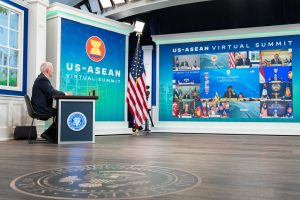On May 12 and 13, the White House will host a “Special Summit” with head of states from the Association of Southeast Asian Nations. The second Special Summit since 2016, its objectives include to discuss ways to increase cooperation and to “exchange views on regional and international issues of common interest and concern.”
The summit also offers a critical opportunity for U.S. President Joe Biden to chart a new course for a more effective multilateral strategy to address the worsening political crisis in Myanmar, even as Washington seeks to forge closer ties with ASEAN members.
April 24 marked one year since ASEAN leaders, including Myanmar junta chief Min Aung Hlaing, signed the Five-Point ASEAN Consensus, which sought to address the crisis in Myanmar following the February 1, 2021, coup and military’s deadly crackdowns on the protest movement. The consensus called for an end to violence, dialogue between concerned parties facilitated by ASEAN, provision of humanitarian assistance by ASEAN, and a visit by ASEAN delegates to Myanmar to meet with concerned parties.
As an ASEAN-led initiative, the consensus was widely endorsed and supported by the larger international community, including the United States, as a path toward reversing the coup and bringing Myanmar back on the track of democratization.
Yet, for a full year, it has failed to make any inroads. Instead, the ASEAN Five-Point approach has provided the military junta with a protective shield from effective international action that could have been consequential for the people of Myanmar. Instead, people were left to fend for themselves against the military’s ongoing campaign of terror and atrocities against civilians across the country. Since the coup, the junta has killed more than 1,800 civilians, arrested over 13,000 people, and destroyed over 8,000 homes. The violence has displaced nearly half a million people within the country and sent 48,000 fleeing to neighboring India and Thailand, according to the United Nations.
Meanwhile, the global preoccupation with the Ukraine crisis has given the junta an additional layer of cover to avoid greater international scrutiny of its heinous crimes.
From the day the Five-Point Consensus was signed, Min Aung Hlaing has never acted in good faith or shown genuine interest in honoring it. Instead, only a few days after the consensus was reached, the junta humiliated the 10-member regional bloc by mocking the consensus as a mere “suggestion” and subsequently refusing to grant permission to the ASEAN Special Envoy at the time, from Brunei, to visit the country to facilitate a political dialogue – one of the key points of the agreement.
The junta continues to blatantly ignore repeated requests from the new ASEAN Special Envoy from Cambodia to meet with members of the ousted civilian government, including its leader Aung San Suu Kyi, who remain in custody or under house arrest.
The junta, known as the State Administration Council (SAC), doubled down on its bold and open contempt for the Five-Point Consensus on April 27 of this year, when it handed down a five-year sentence to Aung San Suu Kyi for corruption charges.
The Myanmar military’s complete violation of the already deeply flawed Five-Point Consensus underscores the need for Washington to go beyond the existing ASEAN framework by abandoning the failed plan and instead using the Special Summit as a platform to convince its ASEAN partners to agree to a new multilateral strategy. Some ASEAN leaders, including those from Malaysia, Indonesia, and Singapore, have already voiced their displeasures with the regime in Naypyidaw. Now, the United States should take advantage of this growing frustration to promote a new diplomatic mechanism, both with ASEAN members and other interested parties beyond the Indo-Pacific region.
ASEAN is now scrambling to organize a regional consultation on humanitarian aid distribution in Myanmar through its humanitarian aid center, known by the acronym AHA, in order to project the appearance of some progress with the points in the consensus. Cambodia, as the current chair of ASEAN, is likely to push a humanitarian aid agenda at the upcoming Washington summit and promote the AHA Center as a vehicle to advance the Five-Point Consensus.
Washington should not support the AHA Center’s involvement in aid coordination and delivery, which by ASEAN mandate would require the junta’s approval and oversight. Promoting the AHA Center’s humanitarian involvement in Myanmar would give the junta not only the propaganda tool it desperately needs, but also the legitimacy it craves. Instead, the Biden administration should roll back support for the failed ASEAN consensus and insist on a new approach to humanitarian aid distribution through community-based organizations and civil society networks operating along Thai-Myanmar and India-Myanmar borders, as Myanmar civil society organizations and rights groups have been promoting over the past year.
The United States should also push to urgently broaden current sanctions on Myanmar to include a ban on the sale and transfer of arms and jet fuel to the junta, which has consistently launched indiscriminate and deliberate attacks on civilian targets.
The U.S.-ASEAN Special Summit represents a vital opportunity for the Biden administration to advance a Myanmar policy that can meaningfully address the ongoing crisis. Every day that such a response is delayed is another day of bloodshed and devastation for the millions of defenseless citizens suffering under the brutal military junta.
































